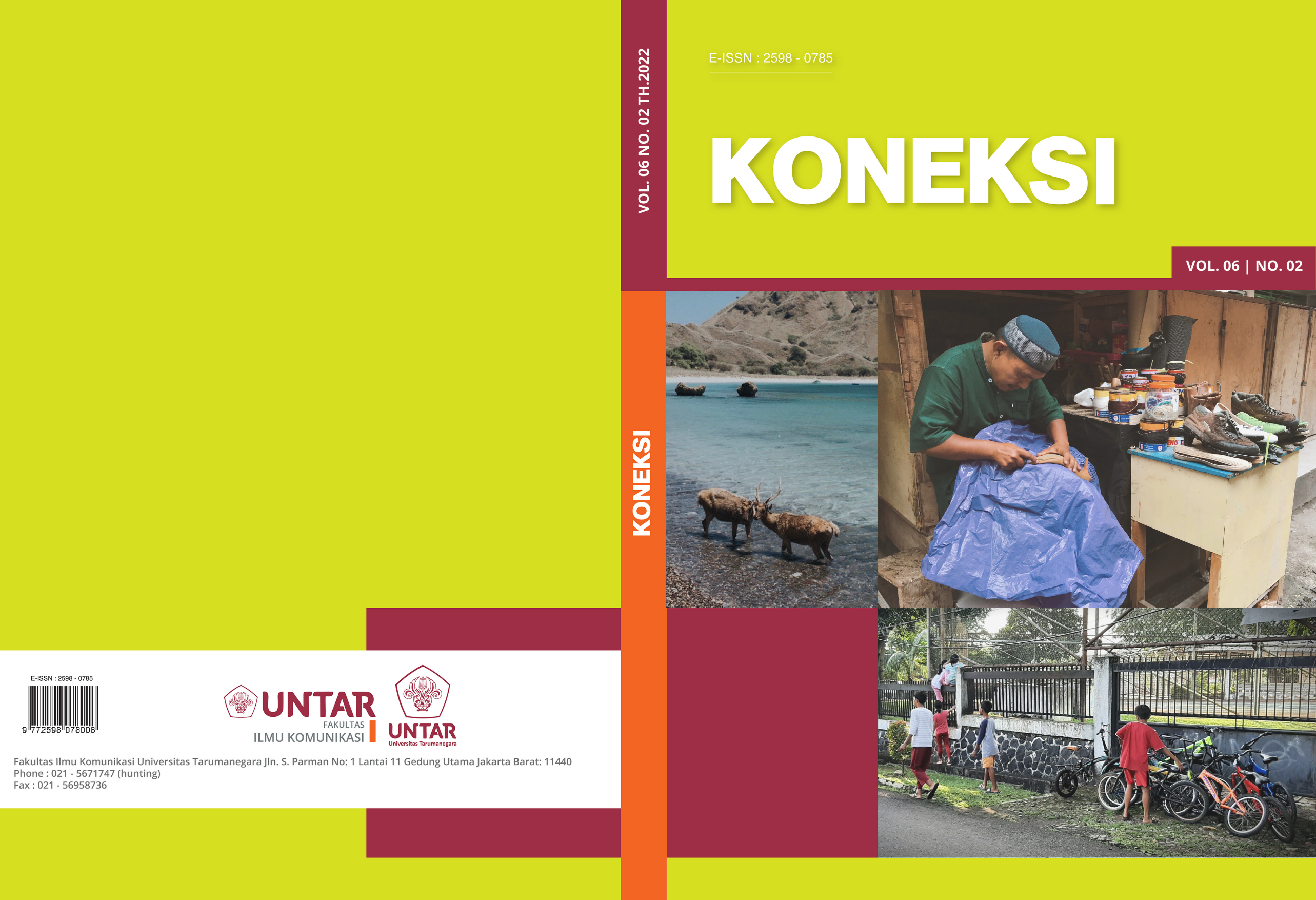Konsep Diri Individu Pengguna Media Sosial
Main Article Content
Abstract
Social media has evolved into the most frequently used platform for obtaining up-to-date information and has evolved into the trend-setting platform for everyday people. The researchers in this study focused on Instagram, one of the most popular social media platforms among teenagers, particularly students. Researchers examined Instagram's impact as a daily social media platform used by students. According to the findings, Instagram influences an individual's mindset, which in turn influences the individual's perception of his or her own concept. Individuals engage in intrapersonal communication following the acquisition of information, according to self-disclosure theory. Individuals in this position use intrapersonal communication to form judgments and perceptions about themselves, both positive and negative. Intrapersonal communication benefits individuals and can become self-motivating when individuals are experiencing difficulties.
Media sosial sudah menjadi platform yang paling sering digunakan untuk mengambil informasi terbaru dan menjadi trend-setter masyarakat sehari-hari. Dalam penelitian ini, peneliti melakukan riset terhadap Instagram sebagai salah satu media sosial yang paling sering digunakan oleh remaja khususnya kalangan mahasiswa. Peneliti menganalisis efek pengaruh dari Instagram sebagai media sosial yang dikonsumsi oleh mahasiswa setiap harinya. Dari hasil temuan, dapat disimpulkan bahwa Instagram mempengaruhi pola pikir individu yang nantinya akan mempengaruhi persepsi individu terhadap konsep dirinya sendiri. Dengan menggunakan teori pengungkapan diri (self-disclosure), individu cenderung melakukan komunikasi intrapersonal setelah menyerap informasi. Komunikasi intrapersonal di posisi ini menjadi sarana individu dalam menarik kesimpulan dan persepsi yang baik maupun buruk terhadap dirinya sendiri. Dalam halnya pemanfaatan, komunikasi intrapersonal membantu individu dan mampu menjadi motivasi diri saat individu sedang terpuruk dalam suatu masalah.
Article Details
Section

This work is licensed under a Creative Commons Attribution-NonCommercial-ShareAlike 4.0 International License.
This work is licensed under a Koneksi Creative Commons Attribution-ShareAlike 4.0 International License.How to Cite
References
Arikunto, S. (2016). Prosedur Penelitian Suatu Pendekatan Praktik. Rineka Cipta.
Bukhori, B. (2016). Kecemasan Berbicara di Depan Umum Ditinjau dari Kepercayaan Diri dan Keaktifan dalam Organisasi Kemahasiswaan. Jurnal Komunikasi Islam, 6(1).
Choi, S., Williams, D., & Kim, H. (2020). A Snap of Your True Self: How Self-Presentation and Temporal Affordance Influence Self-Concept on Social Media. New Media & Society.
Choi, T. R., & Sung, Y. (2018). Instagram versus Snapchat: Self-expression and privacy concern on social media. Telematics and Informatics, 35(8), 2289–2298.
Devadas, B. (2016). A Critical Review of Qualitative Research Methods in Evaluating Nursing Curriculum Models: Implication for Nursing Education in the Arab World. Journal of Education and Practice, 7(7), 119–126.
Fagundes, L. S., Marot, T. A., & Natividade, J. C. (2020). Use of Instagram, Social Comparison, and Personality as Predictors of Self-Esteem. Psico-USF, 25(4), 711–724.
Hadi, S. (2015). Metode Riset. Pustaka Pelajar.
Herhold, K. (2019, January 17). How People Interact on SocialMedia in 2019. The Manifest.
Kholisin. (2014). Kecemasan Berbicara Ditinjau dari Konsep Diri dan Kecemasan Emosional. Jurnal Ilmu Dakwah, 34(1), 77–102.
Krisniawan, E. (2014). Hubungan antara Self-efficacy Dengan Komunikasi Interpersonal Pada Mahasiswa Psikologi Universitas Kristen Satya Wacana.
Lunenburg, F. C. (2010). Communication: The Process, Barriers, and Improving Effectiveness. Schooling, 1(1), 1–11.
Müller, S. M., Wegmann, E., Stolze, D., & Brand, M. (2020). Maximizing Social Outcome? Social Zaping and Fear of Missing Out Mediate the Effects of Maximization and Procrastination on Problematic Social Network Use. . Computers in Human Behaviour, 107(106296), 1–10.
Nadkarni, A., & Hofmann, S. G. (2012). Why Do People USe Facebook? . Personality and Individual Differences, 52(3), 243–257.
Nurika, B. (2016). Hubungan antara Konsep Diri dengan Kepercayaan Diri Remaja yang Mengunggah Foto Selfie di Instagram (ditinjau dari jenis kelamin dan usia).
Pratidina, G. (2015). Hubungan Antara Konsep Diri dengan Kemampuan Komunikasi Interpersonal pada Remaja.
Rakhmawati, Y. (2019). West, R., & Turner, L. H. (2010). Introducing Communication Theory: Analysis and Application. In Komunikasi Antarpribadi: Konsep dan Kajian Empiris. CV. Putra Media Nusantara.
Sampathirao, P. (2016). Self-Concept and Interpersonal Communication. The International Journal of Indian Psychology, 3(6), 177–189.
Supriyati. (2011). Metodologi Penelitian. Lakbat Press.
Valkenburg, P. M. (2017). Understanding Self‐Effects in Social Media. Human Communication Research, 43(4), 477–490.
Xu, H., Gong, Y., Zhang, Q., & Xie, J. (2019). Relationship Between Social Media Activities and Thinking Styles. Marketing Intelligence & Planning, 38(2), 195–208.
Yahaya, A., & Ramli, J. (2009). The Relationship of Self-Concept and Communication Skills Towards Academic Achievement Among Secondary School Students In Johor Bahru. International Journal of Psychological Studies, 1(2), 25–34.

